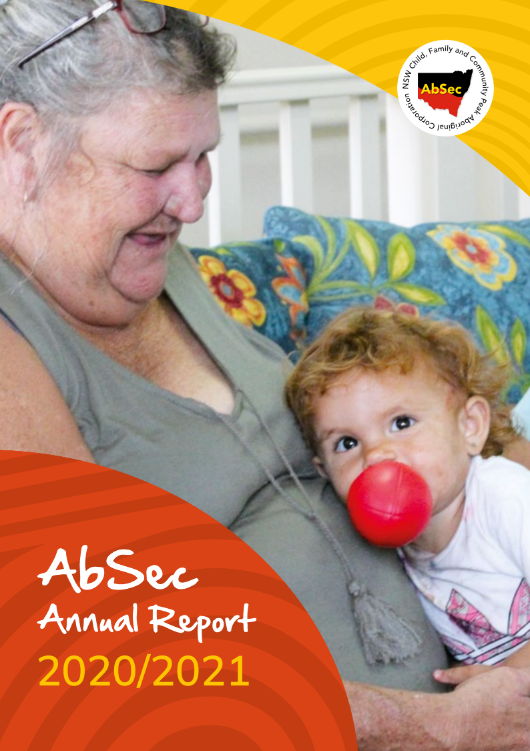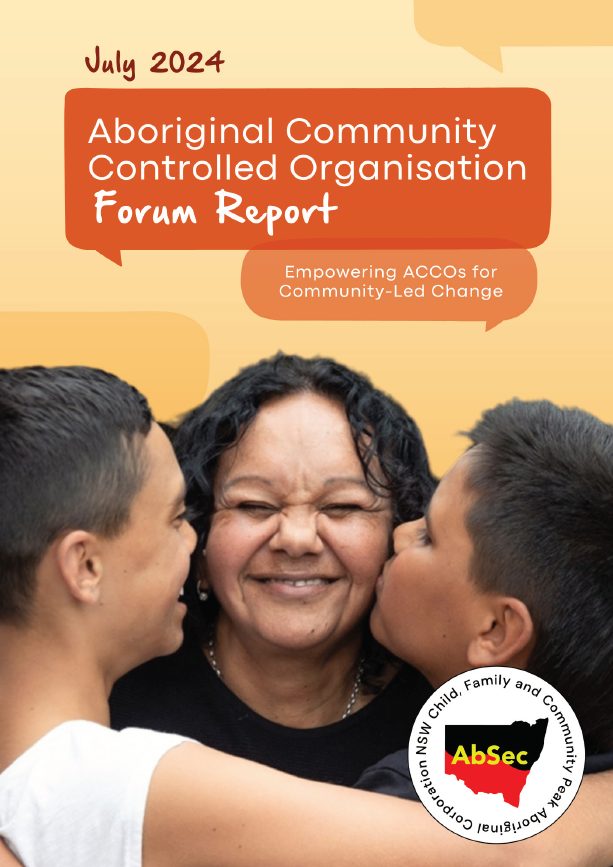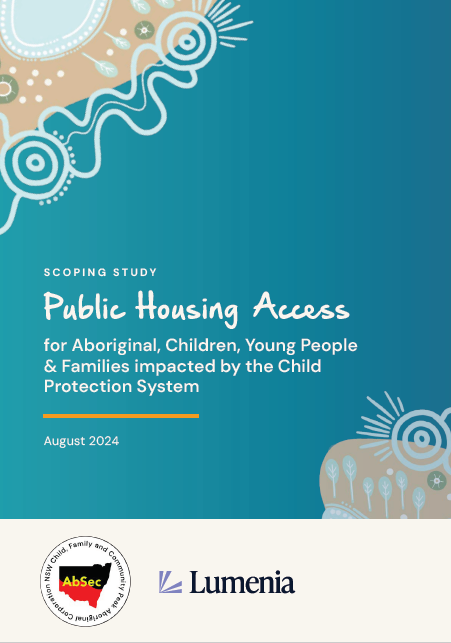Reports & Publications
Gain insight into our work, achievements, and the ongoing efforts to support Aboriginal children, families, and communities in New South Wales.
Annual Reports
Our annual reports highlight our key activities, achievements, and financial performance over the years. They reflect our commitment to transparency and accountability in all that we do.
Sector Forum Reports
A wrap-up of what happened at our Quarterly Sector Forums. We detail who attended, what sessions where held and the overall outcomes of each Forum.
Publications
Our publications cover a range of topics relevant to Aboriginal child and family services. They include research reports, guides, and informational booklets designed to inform and support our stakeholders.
Scoping study: Public Housing Access for Aboriginal children, young peopl and families impacted by the Child Protection System
The scoping study’s literature review highlights significant inequities in housing accessibility for Aboriginal families, stemming from colonisation.
Family is Culture Community Report Card, July 2024
An annual Family is Culture Community Report Card to provide an independent, Aboriginal community perspective on the NSW Government’s implementation of the 2019 Family Is Culture Review Report recommendations.
NSW Aboriginal Child & Family Conference Report, 2023
The 2023 conference was an opportunity to collectively heal, reset our focus and strengthen our determination as a sector to see true change for Aboriginal children, young people, and families.
Family is Culture Community Report Card, September 2023
An annual Family is Culture Community Report Card to provide an independent, Aboriginal community perspective on the NSW Government’s implementation of the 2019 Family Is Culture Review Report recommendations.
Family is Culture Community Report Card, November 2022
This edition focuses on legislative reform and the Children and Young Persons (Care and Protection) Amendment (Family is Culture) Bill 2022. It provides key updates and commentary on the NSW Government’s attempts to progress FIC implementation.
Hearing the voices of Aboriginal people in child welfare - Case Study
In early 2019, AbSec engaged with a number of Aboriginal families and communities affected by DCJ, and invited them to share their experiences and perspectives, and what it means for the safety of, welfare and wellbeing of their families and communities.
AbSec Report Card on the Performance of the NSW Government: Aboriginal Children & Families, 2019
This document examines a number of recent key data relating to Aboriginal children in the out-of-home sector in NSW, highlighting urgent reforms needed for Aboriginal families in the NSW child protection system.
NSW Aboriginal Child & Family Conference Report, 2019
The 2019 conference theme was “Strong Communities Strong Kids”, putting the focus firmly on strategies for involving Aboriginal youth, families and communities in developing services and policies that lead to system change.
Youth Ambassador Program Report, 2018/19
The 2018/19 cohort of AbSec’s Youth Ambassadors outline their priorities and focus over their two-year term. This group of young people provide advice to the sector and speak on what affects Aboriginal children and young people.
Youth Ambassador Program Report, 2016
As part of the AbSec Youth Ambassador program, this report presents the main themes arising from a series of conversations with Aboriginal young people in a number of communities across
NSW, including a number of young people currently in OOHC.
Strategies
Our strategies are designed to drive systemic change, enhance service delivery, and promote the wellbeing of Aboriginal people in NSW.
Aboriginal Workforce Development Statewide Strategy 2020-2025
Developed as part of the NSW Government’s Aboriginal Child and Family Investment Strategy. It identifies ways to strengthen the Aboriginal workforce as part of the government’s commitment to achieve better outcomes for Aboriginal children and families.
Aboriginal Child & Family Investment Strategy Workforce Development Project Consolidated Report
As part of the Aboriginal Child and Family Investment Strategy, AbSec was contracted by DCJ to progress initiatives to enhance current workforce capabilities and promote sector employment opportunities.
Aboriginal Community Response: Communities for kids (Tier 1), 2017
The purpose of this paper is to outline a program framework for universal Aboriginal child and family supports, strengthening networks of care so that Aboriginal children can thrive.
Aboriginal Intensive Family Based Services Plus, 2017
An expanded model of Aboriginal intensive family support and advocacy. This paper applies a model framework developed by AbSec based on feedback received from practitioners.
Achieving a Holistic Aboriginal Child and Family Service System for NSW, 2016
A new approach in Aboriginal child and family services is needed, one that empowers communities and seeks to keep Aboriginal children and young people safely connected with their families, communities and culture.
Strengthening supports for Aboriginal children, young people, families and communities in Far West NSW, 2017
This paper proposes a new way of identifying areas for investment to ensure that Aboriginal children, families and communities are supported by an Aboriginal org in the Far West NSW region.
Strengthening supports for Aboriginal children, young people, families and communities in Western NSW, 2017
This paper proposes a new way of identifying areas for investment to ensure that Aboriginal children, families and communities are supported by an Aboriginal org in Western NSW.
AbSec/FACS co-design: Plan on a Page for Aboriginal Children and Young People 2015-2021
Strong safety-net of Aboriginal community-controlled organisations that effectively meet the needs of Aboriginal children, families and communities through holistic and individually tailored Aboriginal child and family services across NSW, working towards child safe communities and reducing the over representation of Aboriginal children in out-of-home-care and providing for better outcomes over time
Aboriginal Targeted Earlier Intervention Strategy, 2017
The development of an Aboriginal strategy focused on the needs of Aboriginal children, families and communities is long overdue. Aboriginal people continue to be over-represented across the continuum of support, and yet often appear under-represented in services to address risk.
Submissions
AbSec regularly contributes to public policy discussions and legislative processes through detailed submissions. These documents represent our advocacy efforts and our recommendations for systemic improvements.
Submission to the Review of Child Safety Arrangements under the National Quality Framework
Arrangements under the National Quality Framework. This review offers a vital opportunity to consider how policy, regulation and practice can better support Aboriginal and Torres Strait Islander children, young people, and families. It is also a chance for governments to work in genuine partnership with Aboriginal peak bodies and communities to co-design solutions that are culturally safe, community-led and sustainable.
Submission to Fair Work Commission on the review of the Social, Community, Home Care and Disability Services Industry Award 2010
This report outlines AbSec’s position as the NSW peak body for Aboriginal child and family services, advocating for structural reforms that centre lived experience, recognise the unique responsibilities carried by First Nations workers, and ensure no worker is financially disadvantaged under the proposed changes. It also calls for secure, equitable funding to support ACCOs through the transition.
Response to IPART Interim Report on Out of Home Care Costs & Pricing
AbSec welcomes the opportunity to respond to IPART’s draft report on out-of-home care (OOHC) costs and pricing. This submission draws on insight gained through many decades of experience of member ACCOs from across New South Wales that assisted AbSec to prepare this response and has also been endorsed by Burrun Dalai Aboriginal Corporation and Eleanor Duncan Aboriginal Services.
Measuring Outcomes for First Nations Communities
AbSec’s submission to the Senate Select Committee highlighting the urgent need for meaningful reform to address the over-representation of Aboriginal children in OOHC, particularly in New South Wales. Explore the submission to understand the policy changes needed to shift the trajectory and build a better future for Aboriginal children and families.
Aboriginal Bubs Belong to Aboriginal Communities
AbSec submission to Prenatal Policy Review discussion paper:
Supporting Expectant Parents to Keep their Newborn Babies Safe. We, alongside our member ACCOs and the communities we serve, have long called for significant change to DCJ’s prenatal approach.
Family is Culture Recommendations for Immediate Legislative Reform
AbSec and the Aboriginal Legal Service (NSW/ACT), with UTS Jumbunna and PIAC, seek to redress the imbalance by presenting an alternative, community perspective in this paper on the legislative reforms that we believe should be immediately legislated.
Office of the Children’s Guardian Review of accreditation and monitoring functions, 2021
AbSec welcomes this opportunity to provide this submission on the NSW Office of the Children’s Guardian review of accreditation and monitoring functions 2021-22. We thank the OCG for the additional time provided to make this submission.
Submission to the NSW Parliamentary Committee on Children and Young People’s Inquiry into the effectiveness of the NSW child protection and social services system in responding to vulnerable children and their families, 2021
AbSec makes this submission on behalf of our members and stakeholders to the Committee on Children and Young People’s inquiry into the effectiveness of the NSW child protection and social services system in responding to vulnerable children and their families.
Submission to the Legislative Assembly Committee on Law and Safety inquiry into the adequacy of youth diversion programs in NSW, 2018
Given our focus on, and the over representation of, Aboriginal children and young people in the justice system, effective diversion programs for Aboriginal young people must be a priority. We are particularly concerned about those children affected by both the out-of-home care system and the detention system.
AbSec submission to federal inquiry into open adoption, 2018
AbSec is strongly opposed to the coerced adoption of Aboriginal children by statutory child protection systems. Is must be noted that past policies of the forced separation of Aboriginal children and young people from their families, communities, culture and Country is regarded as a key contributor to this ongoing over-representation, It is not a solution.
Shaping a Better Child Protection System, 2017
AbSec’s response to proposed legislative amendments to the Children and Young Persons (Care and Protection) Act 1998 and the Adoption Act 2000, as outlined in FAC’s recent discussion paper. We put forward some serious concerns regarding these legislative reforms, including a lack of consultation with NSW Aboriginal communities and the absence of a clear strategy.
Family is Culture: Independent Review of Aboriginal and Torres Strait Islander Children and Young People in OOHC in NSW, 2017
AbSec welcomes the opportunity to contribute our views, on behalf of our members and stakeholders, to the Independent Review of Aboriginal and Torres Strait Islander Children and Young People in out-of-home care.
Inquiry into support for new parents and babies in NSW, 2017
In this submission, AbSec outlines the broad principles and foundations of effective Aboriginal child and family supports, particularly focused on the needs of Aboriginal parents and babies. Reflecting on current statistics regarding the circumstances of Aboriginal children and families, key frameworks for targeted and effective supports for this cohort are discussed.
Preventing Youth Suicide in New South Wales, 2017
Aboriginal children and young people are particularly over-represented, emphasising the need for a dedicated approach to Aboriginal Youth Suicide Prevention that is tailored to the needs of Aboriginal young people, their families and communities, and co-designed with Aboriginal people and communities.
2016 NSW Budget Expectations
This paper sets out our expectations for the 2016 NSW Budget, where it is our hope that the NSW Government will show leadership in changing the current landscape impacting the future of our Aboriginal communities in NSW.
Royal Commission Consultation Paper on Out Of Home Care, 2016
There are many elements that collectively serve to improve the safety of children and young people in OOHC. These elements have been outlined in the Consultation Paper, including carer assessment processes, screening tools, agency accreditation processes, independent monitoring and oversight, mechanisms for the timely sharing of critical
information.
AHRC Social Justice and Native Title Report, 2015
We state our opposition to the adoption of Aboriginal children through processes designed and administrated by non-Indigenous people, and assert our right to develop and maintain systems for the care of our children.
Senate Standing Committee Community Affairs OOHC, 2014
AbSec welcomes the Senate Inquiry regarding OOHC; our submission includes references to key research and literature and the perspectives of AbSec member agencies.
Royal Commission Issues Paper One: Working with Children Check, 2014
AbSec acknowledges the effects of traumatic past policies and practices that involved the removal and separation of multiple generations of Aboriginal and Torres Strait Islander children from their families across the nation.
Royal Commission Issues Paper Four: Preventing Sexual Abuse of Children in Out-of-Home Care, 2013
Removals have left many legacies, well documented in ‘Bringing Them Home’, the report from the “National Inquiry into the Separation of Aboriginal and Torres Strait Islander Children from Families” and in multiple inquiries and government reports.
FaCS Child Protection OOHC Reforms discussion paper, 2013
AbSec’s response to the proposed reforms cannot be viewed without respect and understanding for the historical context in which our experiences are squarely based.
Papers
Aboriginal Family Preservation and Restoration Model Guidelines, 2020
This paper presents an overview of the collection, use and reporting of service performance data by and for Aboriginal communities to inform the development of a guide for ACCOs.
Data Processes for Aboriginal Organisations: A Discussion Paper, 2020
This paper outlines a model framework developed by AbSec in partnership with ACCO Intensive Based Family Services practitioners and PACT practitioners, drawing on the existing literature about effective family supports from an Aboriginal perspective.
Aboriginal Commissioning Concept Paper, 2018
This paper seeks to outline an Aboriginal commissioning approach as an essential element in establishing an effective Aboriginal child and family service system.
Delivering Better Outcomes for Aboriginal Children and Families in NSW, 2018
This document contains AbSec’s platforms for the upcoming 2019 NSW election, outlining the policies we would like to see parties and leaders commit to.
Our families, our way: Strengthening Aboriginal families so their children can thrive, 2017
The purpose of this paper is to propose a new way of working with Aboriginal people to strengthen, empower and encourage Aboriginal parents and families to provide safe and nurturing environments for their children and young people.
Caring for Carers: Recruitment, development and support for carers of Aboriginal children, 2017
The purpose of this paper is to outline a comprehensive carer support model for carers of Aboriginal children and young people across the domains of recruitment, development and support.
Guardianship orders for Aboriginal children and young people, 2015
While acknowledging the importance of stability for Aboriginal children and young people in out-of-home care, this paper outlines concerns around guardianship orders more broadly, and offers an alternate view to promote better outcomes for Aboriginal children and young people.
Policy briefs
Our policy briefs offer concise analyses of key issues and provide actionable recommendations for policymakers and practitioners. These briefs aim to drive positive change and promote the wellbeing of Aboriginal communities.
Indigenous Data Sovereignty, 2019
This document outlines AbSec’s policy position on Indigenous Data Sovereignty (IDS). IDS refers to the right of Indigenous peoples to exercise authority over the collection, access, analysis and use of data that pertains to them.
Cultural Planning, 2019
Cultural planning is an integral part of case planning focused on ensuring Aboriginal children and young people maintain their connection to culture, identity, family, community and Country. This document presents AbSec’s policy position on Cultural Planning.
Aboriginal Child Safety
All children have the right to feel safe, nurtured and valued, and to grow up healthy and strong in nurturing environments. The safety of children is linked to the security of their families and communities as well as the
accessibility of appropriate support systems.
Aboriginal Community Controlled Organisations
AbSec is committed to ensuring all Aboriginal children, families and communities in NSW have access to the services and supports they need to keep Aboriginal children safe and families strong and provide them the best possible opportunities to fulfil their potential within a culturally enriched framework offered by ACCOs.
Best Interests Principle
The principle of best interests is central to the rights of the child, and therefore plays a central role in decision making in the child protection sector.
The Concept of Community
The concept of community is of critical importance to Aboriginal people, referring to the relationships that we share with each other.
Sense of Identity
Aboriginality and a strong sense of identity as an Aboriginal person is of critical importance to Aboriginal children, families and communities.
The Concept of Kinship
Kinship is particularly important to Aboriginal families and communities, and may represent opportunities to engage broad, caring social networks to support vulnerable families and keep children and young people safe.
Permanent Care Orders for Aboriginal Children and Young People
Permanent care orders within the statutory child protection system remain a pressing concern within the Aboriginal community. Permanent Care Orders for children and young people removed from their families by the State remain a high priority in legislation and practice.
Restoration in the NSW Child Protection System
AbSec’s vision is for all Aboriginal children to be raised in safe, thriving Aboriginal families and communities. This includes ensuring access to tailored services and supports for all Aboriginal families to support their children and young people to be safely restored to their families.
Self-Determination
Self-determination is a fundamental right of peoples, referring to the collective right of peoples to “freely determine their political status and freely pursue their economic, social and cultural development.”
Aboriginal Child Placement Principle
The ACPP is central to ensuring the best interests of the child are recognised and met. This paper seeks to provide guidance on the full implementation of the principle.





































